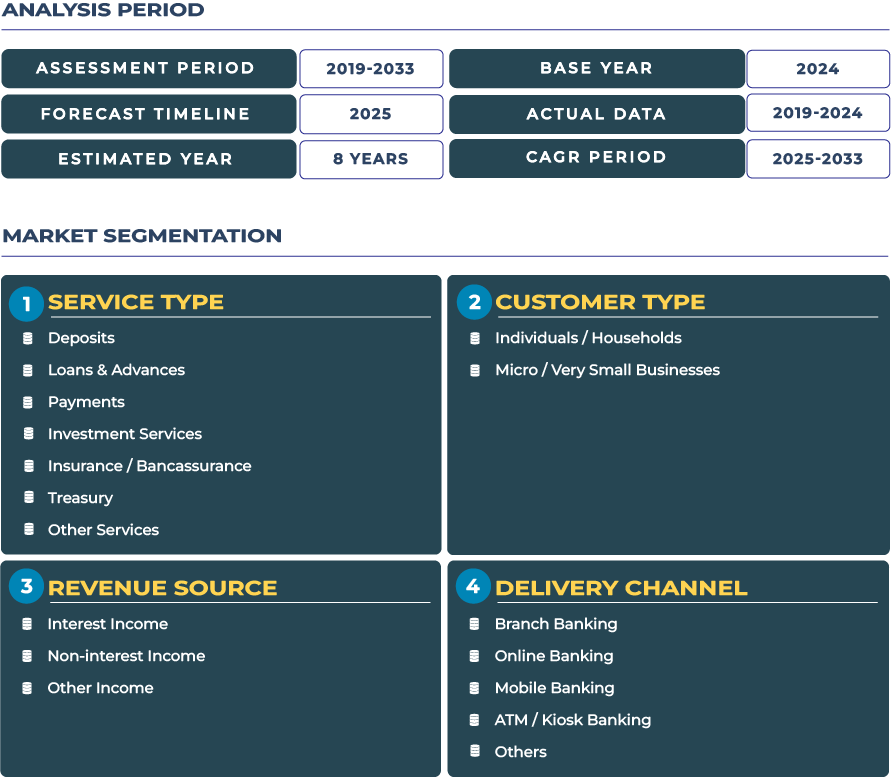Market Outlook: AI-Driven Wealth Management Reshaping Japan Retail Banking Landscape
Japan retail banking market is witnessing a significant transformation as the nation increasingly integrates artificial intelligence and robo-advisory systems into its financial ecosystem. The country, known for its technological innovation and disciplined financial governance, is now steering its retail banking sector toward digital advisory and wealth automation.
Note:* The market size refers to the total revenue generated by banks through interest income, non-interest income, and other ancillary sources.
In 2025, the Japan Retail Banking Market is projected to reach USD 96.0 billion and is expected to grow to USD 132.6 billion by 2033, reflecting a CAGR of 4.1% from 2025 to 2033. This growth is underpinned by Japan strong emphasis on technology-driven personalization, a rising demand for efficient retirement planning tools, and the modernization of traditional banking channels.
Note:* The market size refers to the total revenue generated by banks through interest income, non-interest income, and other ancillary sources.
The Financial Services Agency (FSA) continues to play a central role in shaping the digital transformation roadmap by promoting regulatory frameworks that support open banking and secure financial technology collaboration. Japan aging population and shrinking workforce have accelerated the adoption of AI-based advisory tools that can manage customer portfolios efficiently with minimal human intervention. The convergence of digital banking apps, data-driven lending, and algorithmic investment platforms signifies a major paradigm shift in the Japanese retail banking ecosystem. Institutions are increasingly relying on predictive analytics to enhance decision-making, reduce non-performing loans, and improve customer retention across both urban and rural markets.
Market Outlook: AI-Driven Wealth Management Reshaping Japan Retail Banking Landscape
Japan retail banking market is witnessing a significant transformation as the nation increasingly integrates artificial intelligence and robo-advisory systems into its financial ecosystem. The country, known for its technological innovation and disciplined financial governance, is now steering its retail banking sector toward digital advisory and wealth automation.
Note:* The market size refers to the total revenue generated by banks through interest income, non-interest income, and other ancillary sources.
In 2025, the Japan Retail Banking Market is projected to reach USD 96.0 billion and is expected to grow to USD 132.6 billion by 2033, reflecting a CAGR of 4.1% from 2025 to 2033. This growth is underpinned by Japan strong emphasis on technology-driven personalization, a rising demand for efficient retirement planning tools, and the modernization of traditional banking channels.
Note:* The market size refers to the total revenue generated by banks through interest income, non-interest income, and other ancillary sources.
The Financial Services Agency (FSA) continues to play a central role in shaping the digital transformation roadmap by promoting regulatory frameworks that support open banking and secure financial technology collaboration. Japan aging population and shrinking workforce have accelerated the adoption of AI-based advisory tools that can manage customer portfolios efficiently with minimal human intervention. The convergence of digital banking apps, data-driven lending, and algorithmic investment platforms signifies a major paradigm shift in the Japanese retail banking ecosystem. Institutions are increasingly relying on predictive analytics to enhance decision-making, reduce non-performing loans, and improve customer retention across both urban and rural markets.







